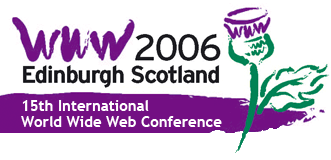Refereed Track: Semantic Web
Where is the Web in the Semantic Web?
The central idea of the Semantic Web is to extend the current
human-readable web by encoding some of the semantics of
web-resources in a machine-processable form. Moving beyond syntax
will open the door to more advanced applications and functionality
on the Web. Computers will be better able to search, process,
integrate and present the content of these web-resources in a
meaningful, intelligent manner.
In past Semantic Web tracks of the WWW conference, much good
work was reported on the Semantic side of the "Semantic Web".
Contributions came from many different fields such as Databases,
Natural Language Processing, Machine Learning, Information
Retrieval, Knowledge Representation, and others. This is important
work that has laid the foundation for the Semantic Web.
In this year's Semantic Web track of the WWW Conference, we want
to re-emphasize the Web aspects of the Semantic Web. We
want to better understand how semantics can provide new levels of
Web functionality, either for end users, or for designers and
developers.
We solicit papers that advance our understanding of how
semantics technologies can be exploited on the Web.
We welcome papers that:
- show how semantics technologies add value to the Web,
achieving things that alternative technologies cannot do as well,
or at all; rigorous evaluations are especially welcome;
- present new semantics technologies, or novel applications of
existing semantics technologies that provide new levels of Web
functionality;
- present new Web technologies, or novel applications of
existing Web technologies that, when combined with semantics
technologies add new Web functionality
Papers risk being deemed out of scope, if they are limited to:
- new results in semantics technologies, where there is no
clear relationship to how they enhance Web functionality;
- new results in Web technologies, if they have little to do
with semantics technologies;
- applications that merely 'happen to' use 'Semantic Web'
technologies (e.g. RDF or OWL), i.e. the Web features are not
used in an interesting way or don't produce interesting new
functionality;
Suggested topics include but are not limited to:
- agent systems on the web
- convergence between semantic web and grid systems
- distributed aspects of semantic representations
- emergent semantics
- provenance, trust & security
- semantic brokering, integration and interoperability
- semantic web services
- semantic web mining
- semantics in peer-to-peer systems
- social networks
- web applications that exploit semantics
Submissions should describe original, previously unpublished,
high quality, innovative work, making significant and preferably
not only theoretical, contributions to the overall design of the
Semantic Web, Semantic Web systems design and application
experience.
Accepted Papers
Yuzhong Qu Wei Hu Gong Cheng Peter F. Patel-Schneider Ian Horrocks Julian Seidenberg Alan Rector Max Völkel Markus Krötzsch Denny Vrandecic Heiko Haller Rudi Studer Yutaka Matsuo Junichiro Mori Masahiro Hamasaki Anupriya Ankolekar Katia Sycara James Herbsleb Robert Kraut Chris Welty Paolo Bouquet Luciano Serafini Stefano Zanobini Boanerges Aleman-Meza Meenakshi Nagarajan Cartic Ramakrishnan Li Ding Pranam Kolari Amit Sheth I. Budak Arpinar Anupam Joshi Tim Finin Nominated for Best Paper Award Chairs
PC Members
- Karl Aberer (Ecole Polytechnique Fédérale de Lausanne)
- Dean Allemang (Boston University)
- Bill Andersen (Ontologyworks)
- Sean Bechhofer (Univ. of Manchester)
- Richard Benjamins (iSOCO)
- Hamish Cunningham (University of Sheffield)
- John Davies (British Telecom)
- Mike Dean (BBN)
- Stefan Decker (Digital Enterprise Research Institute)
- John Domingue (Open University)
- Jerome Euzenat (INRIA)
- Marko Grobelnik (J. Stefan Institute, Slovenia)
- Masahiro Hori (Kansai University, Japan)
- Ian Horrocks (Univ. of Manchester)
- Atanas Kiryakov (Sirma, Bulgaria)
- Brian McBride (HPLabs, UK)
- Sheila McIlraith (Univ. of Toronto)
- Riichiro Mizoguchi (Osaka University, Japan)
- Enrico Motta (Open University UK)
- Wolfgang Nejdl (University of Hannover)
- Jacco van Ossenbruggen (CWI, Amsterdam)
- Jeff Pan (University of Manchester, UK)
- Peter Patel-Schneider (Bell Labs)
- Chris Preist (Hewlett Packard)
- Alan Rector (Univ. of Manchester)
- Guus Schreiber (Vrije Universiteit, Netherlands)
- Steffen Staab (University of Koblenz)
- Heiner Stuckenschmidt (Vrije Universiteit, Netherlands)
- Katia Sycara (Carnegie-Mellon University)
- Hideaki Takeda (National Institute of Informatics)
- Chris Welty (IBM)
|

